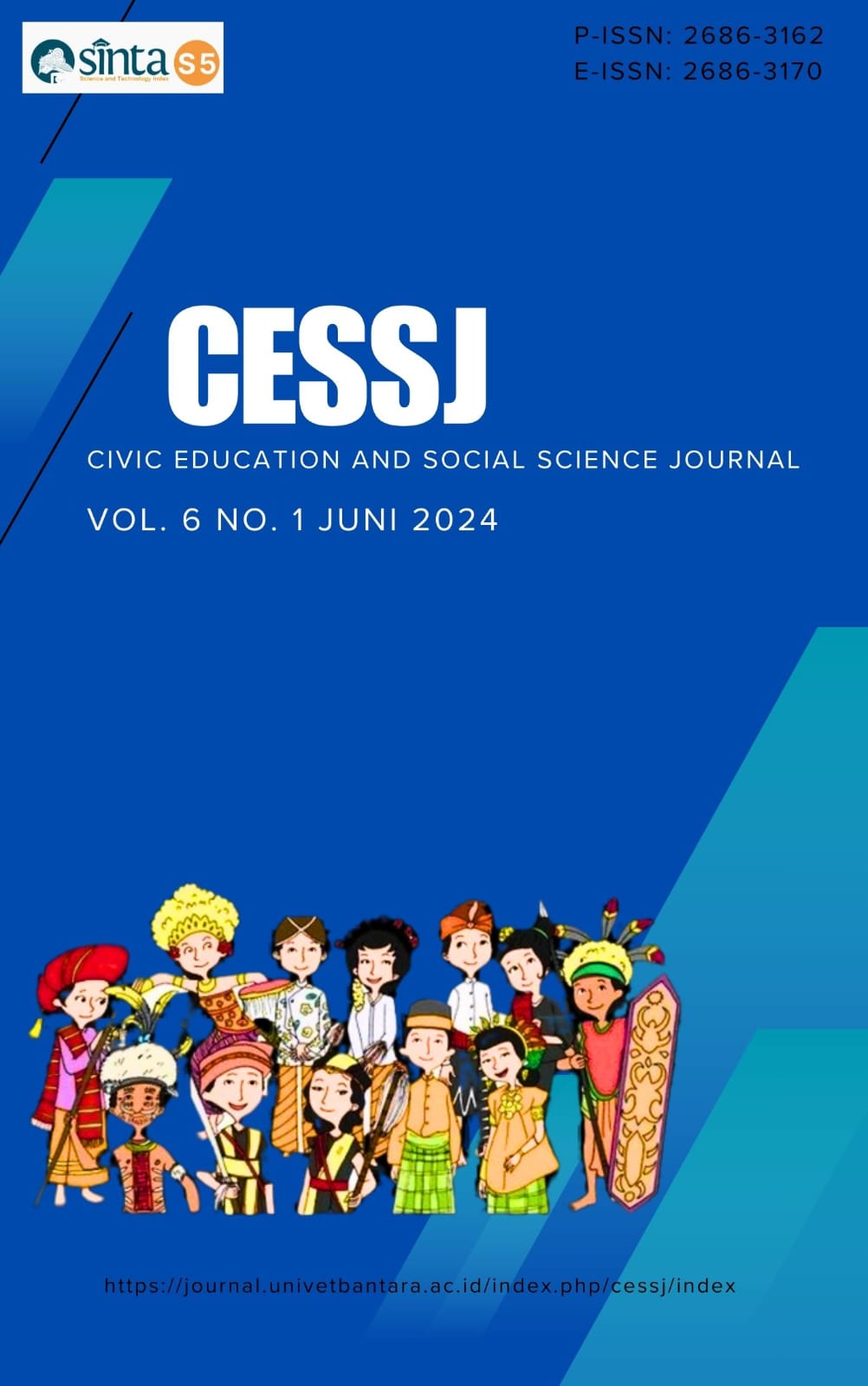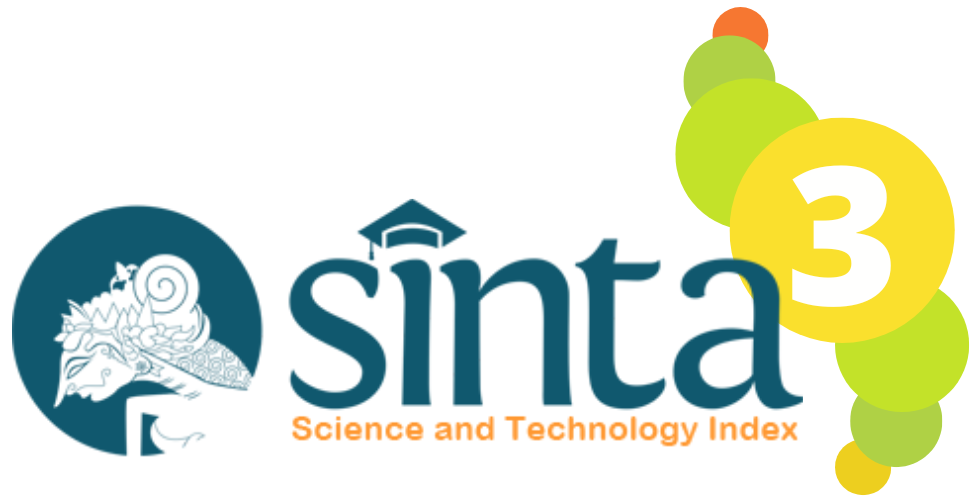Artificial Intelligence: Tantangan dalam Pembelajaran Kewarganegaraan
DOI:
https://doi.org/10.32585/cessj.v6i1.5224Abstract
Penggunaan Artificial Intelligence (AI) dalam pembelajaran kewarganegaraan di SMP Negeri 2 Sentani menghadapi sejumlah tantangan yang signifikan. Bias data, infrastruktur dan SDM yang belum memadai, dan ketergantungan terhadap AI harus diatasi untuk memastikan penggunaan AI dalam pendidikan dapat meningkatkan kualitas pembelajaran tanpa mengorbankan nilai-nilai inti pendidikan kewarganegaraan. Penelitian ini bertujuan untuk mengkaji tantangan artificial intelligence dalam pembelajaran kewarganegaraan di SMP Negeri 2 Sentani. Penggunaan metode kualitatif dengan teknik pengumpulan data melalui wawancara dan observasi partisipatif dalam penelitian ini. Hasil penelitian menemukan AI memainkan peran penting dalam pendidikan dengan membantu guru membuat soal ujian, menilai tugas siswa secara cepat dan akurat, serta memberikan umpan balik yang dipersonalisasi, sehingga meningkatkan efisiensi dan objektivitas. Kesimpulan yang dapat ditarik adalah penggunaan kecerdasan buatan (AI) dalam pembelajaran kewarganegaraan di SMP Negeri 2 Sentani dapat meningkatkan efisiensi dan personalisasi pendidikan, namun tidak dapat menggantikan peran vital guru. Guru tetap penting dalam memberikan bimbingan, membangun hubungan interpersonal, dan memberikan dukungan emosional yang tidak dapat disediakan oleh AI.
Referensi
Ahmad, S. F., Han, H., Alam, M. M., Rehmat, M. K., Irshad, M., Arraño-Muñoz, M., & Ariza-Montes, A. (2023). Impact of artificial intelligence on human loss in decision making, laziness and safety in education. Humanities and Social
Sciences Communications, 10(1). https://doi.org/10.1057/s41599-023-01787-8
Ahmadi, Farid Ibda, H. (2021). Desain Pendidikan dan Teknologi Pembelajaran Daring di Era Revolusi Industri 4.0 dan Society 5.0. Qahar Publisher.
Aquino, Y. S. J. (2023). Making decisions; Bias in artificial intelligence and data- driven diagnostic tools. Australian Journal of General Practice, 52(7). https://doi.org/10.31128/AJGP-12-22-6630
Asrol, L. D., Rifma, & Syahril. (2021). Evaluasi Literasi Kecerdasan Buatan Definisi. Cybernetics: Journal Educational Research and Sosial Studies, 2(April).
Bulut, O., & Wongvorachan, T. (2022). Feedback Generation through Artificial Intelligence. The Open/Technology in Education, Society, and Scholarship Association Conference, 2(1). https://doi.org/10.18357/otessac.2022.2.1.125
Chia, M. Y., Huang, Y. F., Koo, C. H., & Fung, K. F. (2020). Recent Advances in Evapotranspiration Estimation Using Artificial Intelligence Approaches with a Focus on Hybridization Techniques - A Review. In Agronomy (Vol. 10, Issue
1). https://doi.org/10.3390/agronomy10010102
Creswell, W. J. (2016). Penelitian Kualitatif dan Desain Riset, memilih diantara lima pendekatan" oleh John W. Creswell pustaka pelajar edisi 3. Penelitian Kualitatif.
DeCamp, M., & Lindvall, C. (2023). Mitigating bias in AI at the point of care. Science, 381(6654). https://doi.org/10.1126/science.adh2713
Din, B., Nazaretsky, T., Feldman-Maggor, Y., & Alexandron, G. (2023). Automated Identification and Validation of the Optimal Number of Knowledge Profiles in Student Response Data. Proceedings of The 16th International Conference on Educational Data Mining (EDM 2023).
Fernandes, C. W., Rafatirad, S., & Sayadi, H. (2023). Advancing Personalized and Adaptive Learning Experience in Education with Artificial Intelligence. EAEEIE 2023 - Proceedings of the 2023 32nd Annual Conference of the
European Association for Education in Electrical and Information Engineering. https://doi.org/10.2391 /EAEEIE55804.2023.10181336
Harry, A. (2023). Role of AI in Education. Interdiciplinary Journal and Hummanity (INJURITY), 2(3). https://doi.org/10.58631/injurity.v2i3.52
Holmes, W., Bialik, M., & Fadel, C. (2019). Artificial Intelligence in Education:Promises and Implications for Teaching and Learning. The Center for Curriculum Redesign, Boston, MA. USA.
Huang, J., Saleh, S., & Liu, Y. (2021). A review on artificial intelligence in education. Academic Journal of Interdisciplinary Studies, 10(3).
Hutson, J., & Ceballos, J. (2023). Rethinking Education in the Age of AI: The Importance of Developing Durable Skills in the Industry 4.0. Journal of Information Economics, 1(2). https://doi.org/10.58567/jie01020002
Karyadi, B. (2023). Pemanfaatan Kecerdasan Buatan Dalam Mendukung Pembelajaran Mandiri. Educate: Jurnal Teknologi Pendidikan, 8(02), 253–258.
Liao, Y., Loures, E. R., Deschamps, F., Brezinski, G., & Venâncio, A. (2018). The Impact of the Fourth Industrial Revolution: A Cross-Country/Region Comparison. Production, 28. https://doi.org/10.1590/0103-6513.20180061
Malatuny, Y. G. (2020). Percikan Gagasan: Menelaah Problematika Kontemporer Kewarganegaraan. Jakarta: Deepublish.
Malatuny, Y. G. (2022). Literasi Media: Menjawab Tantangan di Era Konvergensi Media. Jakarta: Deepublish.
Manongga, D., Rahardja, U., Sembiring, I., Lutfiani, N., & Yadila, A. B. (2022). Dampak Kecerdasan Buatan Bagi Pendidikan. ADI Bisnis Digital Interdisiplin Jurnal, 3(2). https://doi.org/10.34306/abdi.v3i2.792
McCarthy, J. (2007). Dari sini ke AI Tingkat Manusia. Kecerdasan Buatan (171(18)).
Minaswati, M. (2023). ChatGPT: Keuntungan, Risiko, dan Penggunaan Bijak dalam Era Kecerdasan Buatan. Prosiding Seminar Nasional Pendidikan, Bahasa, Sastra, Seni, Dan Budaya, 42(4).
Patrikar, A. M., Mahenthiran, A., & Said, A. (2023). Leveraging synthetic data for AI bias mitigation. https://doi.org/10.1117/12.2662276
Peng, M., Xie, J., Xiong, M., & Liu, Y. (2023). Artificial Intelligence Education in Primary and Secondary Schools from the Perspective of Thinking Quality. Journal of Contemporary Educational Research, 7(4). https://doi.org/10.26689/jcer.v7i4.4875
Rochim, A. A. (2024). Kecerdasan Buatan : Resiko , Tantangan dan Penggunaan Bijak Pada Dunia Pendidikan. Journal of Social Studies and Humaniora, 3(1).
Sa’adah, A. (2023). Artificial Intelligence with Python. Technometrics, 65(3). https://doi.org/10.1080/00401706.2023.2237826
Sajid Mohammad, S., & Saheal, H. (2023). A Sneak Peek into the Future of Artificial Intelligence in Education: Opportunities and Challenges. In Digital Transformation in Education: Emerging Markets and Opportunities.
https://doi.org/10.2174/9789815124750123010016
Schrumpf, J. (2022). On The Effectiveness Of An Ai-Driven Educational Resource Recommendation System For Higher Education. Proceedings of the 19th International Conference on Cognition and Exploratory Learning in the Digital Age, CELDA 2022. https://doi.org/10.33965/celda2022_202207c052
Singh, S. V., & Hiran, K. K. (2022). The Impact of AI on Teaching and Learning in Higher Education Technology. Journal of Higher Education Theory and Practice, 22(13). https://doi.org/10.33423/jhetp.v22i13.5514
Sinha, A., Sapra, D., Sinwar, D., Singh, V., & Raghuwanshi, G. (2023). Assessing and Mitigating Bias in Artificial Intelligence: A Review. Recent Advances in Computer Science and Communications, 17(1). https://doi.org/10.2174/2666255816666230523114425
Subiyantoro, H., Hartono, R., Fitriati, S. W., & Faridi, A. (2023). Dampak Kecerdasan Buatan (AI) terhadap Pengajaran Bahasa Inggris di Perguruan tinggi: Tantangan dan Peluang. Prosiding Seminar Nasional Pascasarjana
(PROSNAMPAS), 6(1), 346–349.
Supriyadi, E. I., & Asih, D. B. (2021). Implementasi Artificial Intelligence (AI) di Bidang Administrasi Publik pada Era Revolusi Industri 4.0. Jurnal RASI, 2(2). https://doi.org/10.52496/rasi.v2i2.62
The Fourth Industrial Revolution and Education. (2018). In South African Journal of Science (Vol. 114, Issues 5–6). https://doi.org/10.17159/sajs.2018/a0271 Ulnicane, I., & Aden, A. (2023). Power and politics in framing bias in Artificial Intelligence policy. Review of Policy Research, 40(5). https://doi.org/10.1111/ropr.12567
Wibowo, H. S. (2023). Pengembangan Teknologi Media Pembelajaran: Merancang Pengalaman Pembelajaran yang Inovatif dan Efektif. Tiram Media.
Yang, H., Anbarasan, M., & Vadivel, T. (2022). Knowledge-Based Recommender System Using Artificial Intelligence for Smart Education. Journal of Interconnection Networks, 22. https://doi.org/10.1142/S0219265921430313
Zawacki-Richter, O., Marín, V. I., Bond, M., & Gouverneur, F. (2019). Systematic Review of Research on Artificial Intelligence Applications in Higher Education – Where are the Educators? In International Journal of Educational
Technology in Higher Education (Vol. 16, Issue 1). https://doi.org/10.1186/s41239-019-0171-0
Downloads
Downloads
Published
Issue
Section
License
Copyright (c) 2024 Julianus Labobar

This work is licensed under a Creative Commons Attribution-ShareAlike 4.0 International License.
Authors who publish with the Civics Education and Social Science Journal (CESSJ) agree to the following terms:
- The journal allow the authors to hold the copyright without restrictions and allow the authors to retain publishing rights without restrictions.
- Authors retain copyright and grant the journal right of first publication with the work simultaneously licensed under a Creative Commons Attribution 4.0 International License that allows others to share the work with an acknowledgement of the work's authorship and initial publication in this journal.
- Authors are able to enter into separate, additional contractual arrangements for the non-exclusive distribution of the journal's published version of the work (e.g., post it to an institutional repository or publish it in a book), with an acknowledgement of its initial publication in this journal.
- Authors are permitted and encouraged to post their work online (e.g., in institutional repositories or on their website) prior to and during the submission process, as it can lead to productive exchanges, as well as earlier and greater citation of published work (See The Effect of Open Access).
in 2025, The Author

This work is licensed under a Creative Commons Attribution 4.0 International License.










